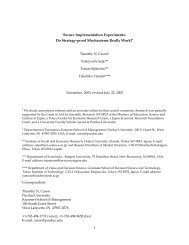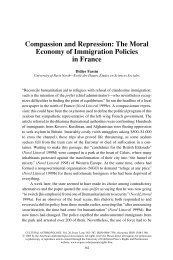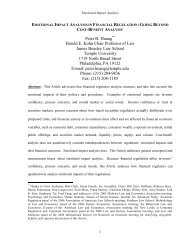Governance, Growth, and Development Decision-making - School of ...
Governance, Growth, and Development Decision-making - School of ...
Governance, Growth, and Development Decision-making - School of ...
Create successful ePaper yourself
Turn your PDF publications into a flip-book with our unique Google optimized e-Paper software.
thinking about how to build the rule <strong>of</strong> law in a society, enhance its<br />
voice <strong>and</strong> accountability, or control corruption at large.<br />
So my bottom line for economists in the business <strong>of</strong> <strong>of</strong>fering<br />
advice on governance-as-an-end would be simple: don’t do it!<br />
2. <strong>Governance</strong> as a Means<br />
<strong>Governance</strong> has instrumental value ins<strong>of</strong>ar as it provides producers<br />
<strong>and</strong> households with greater clarity on the rules <strong>of</strong> the game <strong>and</strong> investors<br />
with greater assurance that they can appropriate the returns<br />
to their efforts. That is the essential point that the institutions-<strong>and</strong>growth<br />
literature has emphasized. It is also the main rationale for<br />
thinking <strong>of</strong> governance reform in the context <strong>of</strong> growth strategies.<br />
The long-run association between good governance <strong>and</strong> high<br />
incomes is incontrovertible. The existence <strong>of</strong> a causal link from the<br />
former to the latter is now also widely accepted. What is less well<br />
understood is that this long-run association provides very little<br />
guidance for appropriate strategies to induce high growth. It certainly<br />
does not suggest we can systematically rely upon improved governance<br />
to generate increased growth over the time horizons that<br />
policy makers <strong>and</strong> their advisors care about (a decade or two). I am<br />
not aware <strong>of</strong> any strong econometric evidence that relates st<strong>and</strong>ard<br />
governance criteria to growth (all the evidence is about income levels).<br />
And there are enough countries that are growing rapidly despite<br />
poor governance—China, Vietnam, Cambodia to name some <strong>of</strong> the<br />
prominent Asian examples—to render suspect any general claim to<br />
the contrary. Indeed, we should take it as good news that large-scale<br />
institutional transformation—<strong>of</strong> the type entailed by the governance<br />
agenda—is hardly ever a prerequisite for getting growth going.<br />
This may seem paradoxical at first sight, but it should not be.<br />
Poor countries suffer from a multitude <strong>of</strong> constraints, <strong>and</strong> effective<br />
growth policies are those that address the most binding among<br />
them. Poor governance in general may be the binding constraint<br />
in Zimbabwe <strong>and</strong> some others, but it apparently was not in China,<br />
Vietnam, or Cambodia, <strong>and</strong> it most surely is not in Ethiopia, South<br />
Dani Rodrik 19
















